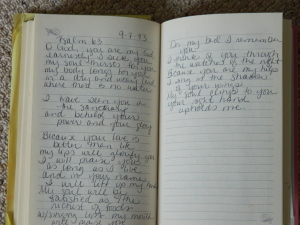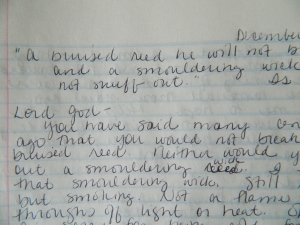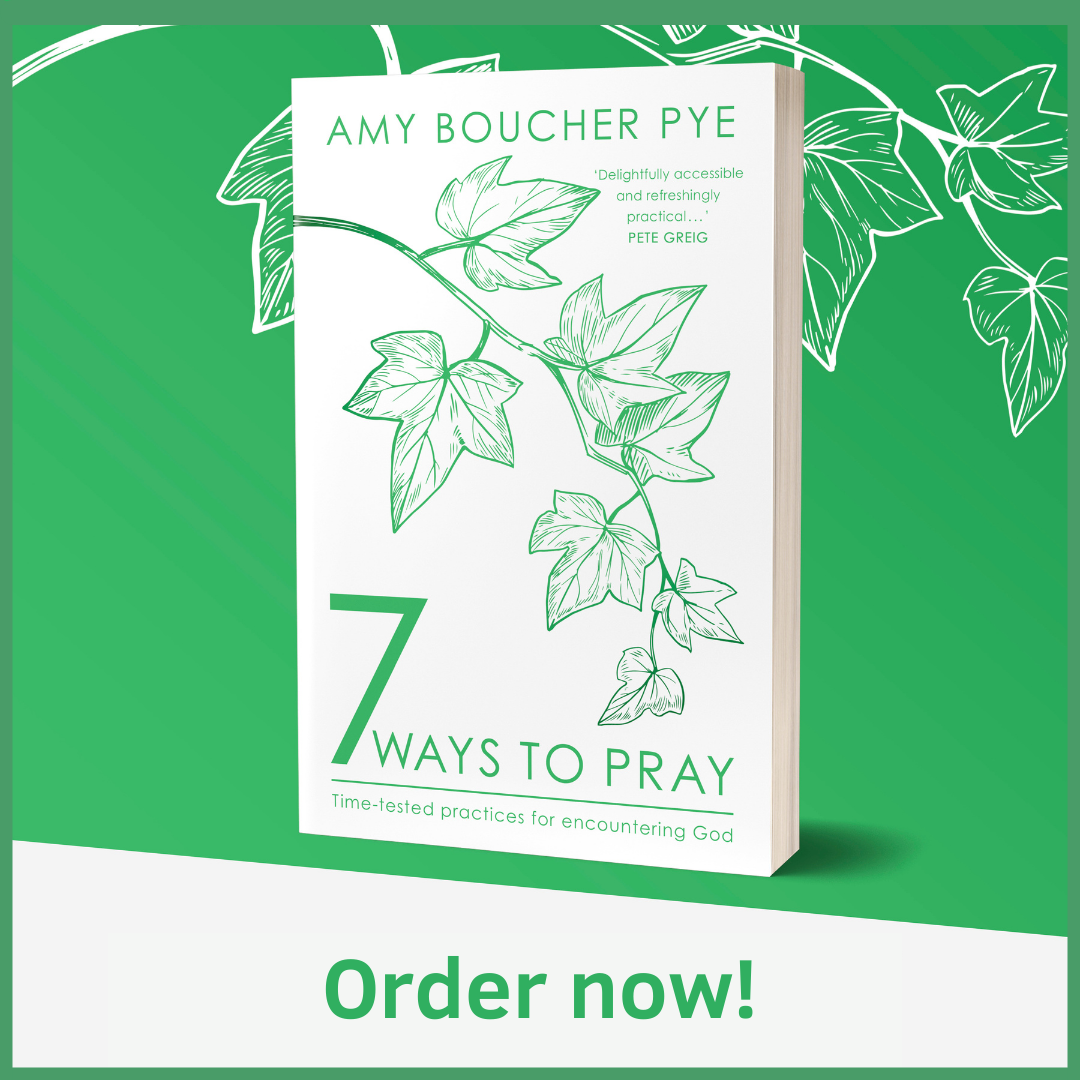How to Keep a Spiritual Journal: A Treasure Trove of God’s Love
This article originally appeared in Woman Alive in January 2014, and I presented its contents at All That We Are, the Woman Alive/BRF retreat at the Christian Resources Exhibition in May 2013. The next Woman Alive/BRF day will be 6 June 2015 in Woking. Join us!
“I hate my life.”
“Why am I so stupid?”
“Will I ever have a boyfriend?”
Sentiments like that – and a lot worse – used to fill my journals in my teens and early twenties. Angst, fear, bitterness – I would let rip in my personal diary, not realizing the damage I inflicted as I wallowed in my pain.
Then in my mid-twenties I edited Leanne Payne’s Listening Prayer: Learning to Hear God’s Voice and Keep a Prayer Journal. She gave me the tools to turn my former depository of self-hatred into a spiritual treasure trove of love and affirmation. I threw away my old journals and dedicated my new, floral ring-binder to be a place for conversation with God. At the time I was also learning to receive God’s love and forgiveness; I would take my angst and pain to Jesus on the cross, confess any sins, then wait to receive God’s love and release. My new spiritual journal echoed these practices of sloughing off the old self and embracing the new. I was a new creation!
Twenty years later, I can’t imagine not keeping a spiritual journal. It’s the place where I am most open and free with God, telling him my deepest dreams, longings and fears. Here I praise and adore him; here I confess my wrongs and how sorry I am; here I intercede for those known to me; here I ask him to lead and guide and help me. And, importantly, here I stop the chatter and silence myself, poised to hear his still, small voice. Here he calls me his beloved.
Although I can’t imagine life without a spiritual journal, I know this practice isn’t for everyone – my husband, for instance. I don’t want to inflict guilt on those for whom it’s a chore or a shame-inducing exercise. Not everyone likes to write; we need to find what fits our personalities best. But if you like words and want to dedicate yourself to this practice in the new year, here are some tips for keeping a spiritual journal.
Practicalities
A pretty pattern used to adorn my journal, but now I type into a special file on my laptop. I open a new file each day, organized in monthly folders, categorized by year. You might prefer the tactile feeling of ink on paper, especially in a wonderful leather-jacketed journal. Experiment with different formats until you find what suits you.
Privacy
One of my most important pieces of advice is guard your privacy. Find someone who will agree to destroy – without reading them – your journals when you die or are incapacitated. We hold ourselves back from being unvarnished with God when we think someone might stumble on our secrets. If we’re constantly looking over our shoulders, wondering what our audience thinks of us, we curtail the freedom God wants us to enjoy. We will share the treasures mined from our journals through our personal ministries, whatever those may be, but we’ll be handing out the jewels as gifts rather than letting thieves steal and destroy. Keep your treasure chest closed and locked.
Content
What shall we put into our journals? You will find your own best practice. Leanne Payne outlines six areas, including God’s word, praise and thanksgiving, intercession, petition, forgiveness. Or a simple format is ACTS: adoration, confession, thanksgiving, supplication. Let’s explore these four areas.
Adoration
Taking the time to praise God lifts us out of ourselves and our concerns. Praising God can change our outlook – we can become infused with joy and peace as we echo King David’s psalms or think about a special hymn or song. When we feel dry spiritually, praising God might be more of an act of the will than of our feelings.
Confession
I was raised Roman Catholic, so I don’t find confession foreign. But we don’t need to confess to a priest (although some find that helpful); we can tell the Lord what we’ve done or those things we’ve left undone. As I said above, we can take them to the cross and there receive forgiveness. I find that writing out my sins forces me to be specific.
Thanksgiving
Having a special thanksgiving section gives us a rich record of God’s goodness. Naming what we’re thankful for can change our whole outlook and demeanor, as Ann Voskamp details in One Thousand Gifts. She started a gratitude journal, writing down 1000 things she appreciated. It opened her eyes to the mercies she might have otherwise missed: a bumblebee perched on a lavender flower; the sound of the breeze in the trees; the smile of a child.
Supplication
God our heavenly Father wants us to ask of him. He invites us to bring to him our supplications – our requests – whether for ourselves or for others. Just as a good parent longs to hear what’s on their child’s heart, so the Lord invites us to approach him with our needs – whether big or small. We can set goals with him. We can share our dreams and see him cup them safely in his hand.
My practice
I try to incorporate ACTS into my devotions. Most often I will read through a book of the Bible, focusing on a chapter each day. As I chew it over, a verse or two usually pops out and I sense the Holy Spirit leading. Those verses I write out so that they can sink into my being. I turn them into a prayer, speaking them back to the Lord with different words. That leads to me express what’s on my heart, whether praise of God’s goodness and faithfulness; a buried longing; hurts and irritations I need release from; prayers of thanks.
And then I stop and wait for God’s still, small voice. I wait for any words of love and affirmation; of direction and leading. Some days, all I seem to need to hear is, “I love you.”
Benefits
So why keep a prayer journal? Three reasons in closing:
It’s a safe outlet for our feelings.
Here we can be totally honest and give to God any bitterness, shame, fear or pain. We can receive God’s love with feeling awkward or self-conscious.
It becomes a spiritual treasure trove.
Once a year, usually around New Year’s, I reread my year of journals and note down the “spiritual highlights.” This exercise reveals what I’ve been most struggling with or rejoicing over throughout the year. I see where God has answered prayer and which requests I’m still holding before him. I see his direction, love and leading.
It’s a tactile record of daily life.
Our journals provide an amazing snapshot of what’s going on, not only our inner life but the daily stuff of life – which friend is hurting or parent ailing or child succeeding. When we reread journals from years ago, we can smell the frying bacon or hear the sand washing up on shore. Long-hidden memories come flooding back.
Might you consider keeping a spiritual journal? If so, let me close with a prayer:
Father God, thank you that you’ve created us and spoken life into us. That you long to converse with us. Help us to find just the right mode of communication, that we might implement a spiritual practice to aid our growth in maturity and love for you. May we put aside the rags of the old self and embrace the royal robes you have created just for us as children of the King. Amen.










 Hello!
Hello! 
I write my journal more on an ‘as and when’ basis i.e. when I have something I need to talk over with God or when God has something he needs to tell me. I seem to do most of the talking though!
Easy to do all the talking, to be sure! I’m not always sure it’s really God talking back to me, but often in looking back I can see his whispers…